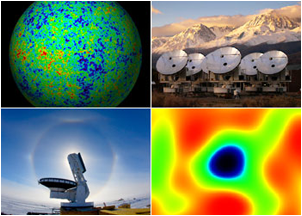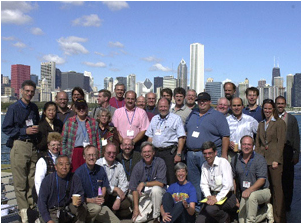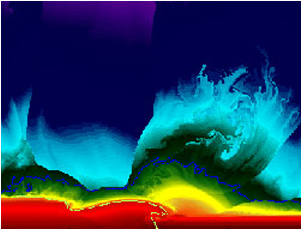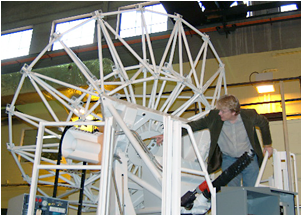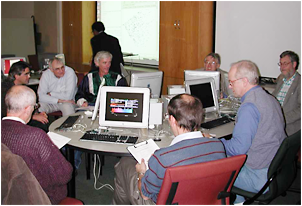- 2010
- "The Dark Universe", Cosmology Short Course
- 2007
- "Chicago Maps the Cosmos", Cosmology Short Course
- 2005
- "Big Bang & Beyond, 21st Century Cosmology", Cosmology Short Course
- 2004
- "Extreme Astronomy @ the Planetarium", Cosmology Short Course
- 2003
- "Origin of Structure in the Universe", Cosmology Short Course
- 2001
- "The New Cosmology: From Quantum Fuzz to the Accelerating Universe", Cosmology Short Course
"The Dark Universe", Cosmology Short Course
Website
September 24 - 26, 2010
For over 70 years, astrophysicists have had indications that much of our universe is made up of dim or invisible material. Today, a wide variety of astronomical observations all point us to the conclusion that the vast majority (about 95%) of the energy and mass in our universe is not made up of atoms, but instead consists of exotic and rather poorly understood substances we call dark matter and dark energy. This short course will discuss what we know about dark matter and dark energy, and how we came to learn that they exist. We will also explore how future experiments might help us to better understand dark matter and dark energy, and roles that they play in our universe's past, present, and future.
September 24 - 26, 2010
For over 70 years, astrophysicists have had indications that much of our universe is made up of dim or invisible material. Today, a wide variety of astronomical observations all point us to the conclusion that the vast majority (about 95%) of the energy and mass in our universe is not made up of atoms, but instead consists of exotic and rather poorly understood substances we call dark matter and dark energy. This short course will discuss what we know about dark matter and dark energy, and how we came to learn that they exist. We will also explore how future experiments might help us to better understand dark matter and dark energy, and roles that they play in our universe's past, present, and future.
"Chicago Maps the Cosmos", Cosmology Short Course
Website
December 7 - 9, 2007
This three-day, intensive short course will highlight cartography on the grandest scales: mapping the cosmos. It will explore the ethereal science of cosmology in the concrete terms of the observed hierarchical structure of the universe - which we have only recently come to understand. Chicago Maps the Cosmos will explore our current understanding of the cosmos from the perspective of those who are at the forefront of investigating it, and it will provide participants with the tools they need to bring the excitement of discovery back to their home institutions. Chicago Maps the Cosmos will also encompass the broader themes of Festival of Maps: Chicago - cartography, discovery, exploration, inspiration and showcasing the local riches of the city of Chicago.
December 7 - 9, 2007
This three-day, intensive short course will highlight cartography on the grandest scales: mapping the cosmos. It will explore the ethereal science of cosmology in the concrete terms of the observed hierarchical structure of the universe - which we have only recently come to understand. Chicago Maps the Cosmos will explore our current understanding of the cosmos from the perspective of those who are at the forefront of investigating it, and it will provide participants with the tools they need to bring the excitement of discovery back to their home institutions. Chicago Maps the Cosmos will also encompass the broader themes of Festival of Maps: Chicago - cartography, discovery, exploration, inspiration and showcasing the local riches of the city of Chicago.
"Big Bang & Beyond, 21st Century Cosmology", Cosmology Short Course
Website
September 23 - 25, 2005
This three day course will take participants to the frontiers of current cosmological research and provide them with the necessary tools to bring the excitement of discovery back to their home institutions. By bringing together the researchers making the discoveries with planetarium/museum/science center staff, who interact daily with the public, this course will help energize the presentation of cosmology in informal educational settings.
This intensive course will establish the framework of standard Big-Bang cosmology and provide insights into recent discoveries into its inner workings. We will follow the evolution of the universe from its earliest moments, about 14 billion years ago when it was a soup of elementary particles, until the present day when it is a tangled web of filaments consisting of galaxies and clusters of galaxies. The observational foundations of our understanding of the universe include measurements of the temperature anisotropy in the cosmic microwave background, the spatial distribution of galaxies and clusters of galaxies, and the expansion history of the universe. On the theoretical side, we will focus on cosmic acceleration at the two ends of time. We will review the predictions of cosmic inflation, acceleration during the short moment of time after the Big Bang, and see how to test them with current and future observations.
September 23 - 25, 2005
This three day course will take participants to the frontiers of current cosmological research and provide them with the necessary tools to bring the excitement of discovery back to their home institutions. By bringing together the researchers making the discoveries with planetarium/museum/science center staff, who interact daily with the public, this course will help energize the presentation of cosmology in informal educational settings.
This intensive course will establish the framework of standard Big-Bang cosmology and provide insights into recent discoveries into its inner workings. We will follow the evolution of the universe from its earliest moments, about 14 billion years ago when it was a soup of elementary particles, until the present day when it is a tangled web of filaments consisting of galaxies and clusters of galaxies. The observational foundations of our understanding of the universe include measurements of the temperature anisotropy in the cosmic microwave background, the spatial distribution of galaxies and clusters of galaxies, and the expansion history of the universe. On the theoretical side, we will focus on cosmic acceleration at the two ends of time. We will review the predictions of cosmic inflation, acceleration during the short moment of time after the Big Bang, and see how to test them with current and future observations.
"Extreme Astronomy @ the Planetarium", Cosmology Short Course
Website
September 24 - 26, 2004
This three-day intensive short course will explore the most violent and mysterious realms of modern astronomy: astronomy of the highest energy phenomena. It will probe the science behind the violent worlds of black holes, neutron stars, active galactic nuclei, supernovae, high energy particles from space, x-ray & gamma-ray bursts as well as the experiments to observe these phenomenon. The instructors will be researchers at the scientific forefront who are trying to understand these incredibly powerful events. The course will provide participants with a firm foundation in modern high energy astronomy. It will also offer practical tools, such as short animations, that will help participants bring this world to a wider audience. Ultimately this KICP course aims to help bring the excitement of discovery into the planetarium and thereby to the public.
September 24 - 26, 2004
This three-day intensive short course will explore the most violent and mysterious realms of modern astronomy: astronomy of the highest energy phenomena. It will probe the science behind the violent worlds of black holes, neutron stars, active galactic nuclei, supernovae, high energy particles from space, x-ray & gamma-ray bursts as well as the experiments to observe these phenomenon. The instructors will be researchers at the scientific forefront who are trying to understand these incredibly powerful events. The course will provide participants with a firm foundation in modern high energy astronomy. It will also offer practical tools, such as short animations, that will help participants bring this world to a wider audience. Ultimately this KICP course aims to help bring the excitement of discovery into the planetarium and thereby to the public.
"Origin of Structure in the Universe", Cosmology Short Course
Website
September 26 - 28, 2003
The Center for Cosmological Physics offers a pioneering short course for planetarium staff aimed at incorporating modern cosmology into public programming.
Forty-six (46) planetarians attended "Origin of Structure in the Universe." They came from as far away as Japan and from planetariums of all sizes (e.g., from inflatable domes to the Hayden Planetarium).
The course was a mixture of lectures, hands-on and computer laboratories, tours of research facilities, and question and answer/discussion sections. Participants were also provided with resources to use back at their home institutions. These resources included short movies and electronic versions of all lectures. A follow-up session, lead by CfCP Director Bruce Winstein, was held at the 2003 annual Great Lakes Planetarium Association (GLPA) meeting in Cleveland. As a subsidiary objective of the short course was to establish a collaborative network, the CfCP also continues to stay in touch with the participants via e-mail and the Internet.
September 26 - 28, 2003
The Center for Cosmological Physics offers a pioneering short course for planetarium staff aimed at incorporating modern cosmology into public programming.
Forty-six (46) planetarians attended "Origin of Structure in the Universe." They came from as far away as Japan and from planetariums of all sizes (e.g., from inflatable domes to the Hayden Planetarium).
The course was a mixture of lectures, hands-on and computer laboratories, tours of research facilities, and question and answer/discussion sections. Participants were also provided with resources to use back at their home institutions. These resources included short movies and electronic versions of all lectures. A follow-up session, lead by CfCP Director Bruce Winstein, was held at the 2003 annual Great Lakes Planetarium Association (GLPA) meeting in Cleveland. As a subsidiary objective of the short course was to establish a collaborative network, the CfCP also continues to stay in touch with the participants via e-mail and the Internet.
"The New Cosmology: From Quantum Fuzz to the Accelerating Universe", Cosmology Short Course
Website
October 26 - 28, 2001
The CfCP offered a three-day intensive short course on cosmology for college faculty. The course was designed to revitalize undergraduate curricula by communicating the latest advances in cosmological research to classroom teachers. The course drew upon the experimental and theoretical strengths of the center and the CfCP's appreciation of their interplay in modern cosmology. This course was a resounding success (see evaluations).
Center members offered participants a solid background and insights into the latest advances in research. Laboratory sessions provided hands-on experiences with leading edge technology (e.g., detecting the cosmic microwave background, CMB) and practical exercises (e.g., use of the web-based Sloan Digital Sky Server, SDSS). Field trips to Fermi National Laboratory and the Adler Planetarium provided additional dimensions to the course (e.g., science on a grand scale and public communication).
Our collaborators - the Chautauqua Organization, Adler Planetarium and Astronomy Museum, Fermi National Accelerator Laboratory, and CARA - enriched the short-course through their involvement and with the leveraged resources they provided. The 35 participants were primarily faculty from non-research undergraduate institutions but included three local high school teachers and three staff members from the American Museum of Natural History who are working on a cosmology exhibit. Course evaluations indicated that The New Cosmology reinvigorated the faculty and gave them practical tools to bring the discoveries at the frontiers of physics back into their classrooms.
October 26 - 28, 2001
The CfCP offered a three-day intensive short course on cosmology for college faculty. The course was designed to revitalize undergraduate curricula by communicating the latest advances in cosmological research to classroom teachers. The course drew upon the experimental and theoretical strengths of the center and the CfCP's appreciation of their interplay in modern cosmology. This course was a resounding success (see evaluations).
Center members offered participants a solid background and insights into the latest advances in research. Laboratory sessions provided hands-on experiences with leading edge technology (e.g., detecting the cosmic microwave background, CMB) and practical exercises (e.g., use of the web-based Sloan Digital Sky Server, SDSS). Field trips to Fermi National Laboratory and the Adler Planetarium provided additional dimensions to the course (e.g., science on a grand scale and public communication).
Our collaborators - the Chautauqua Organization, Adler Planetarium and Astronomy Museum, Fermi National Accelerator Laboratory, and CARA - enriched the short-course through their involvement and with the leveraged resources they provided. The 35 participants were primarily faculty from non-research undergraduate institutions but included three local high school teachers and three staff members from the American Museum of Natural History who are working on a cosmology exhibit. Course evaluations indicated that The New Cosmology reinvigorated the faculty and gave them practical tools to bring the discoveries at the frontiers of physics back into their classrooms.


